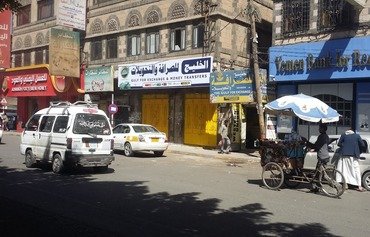The value of Yemen's riyal continues to drop against other foreign currencies in the local market, exacerbating the country's already dire humanitarian situation, economists tell Al-Mashareq.
The value of the US dollar and the Saudi riyal continued to rise against the Yemeni riyal after Eid al-Fitr, with the exchange rate reaching 362 Yemeni riyals to the US dollar, up from 350 on July 2nd, and 95 Yemeni riyals to the Saudi riyal, the highest rate so far.
The value of the riyal against foreign currencies has declined steadily since the start of the war in March 2015, when the exchange rate stood at 215 Yemeni riyals to the US dollar.
"The deteriorating security and political conditions in the country and the lack of a monetary policy aimed at preserving the Yemeni riyal value are the factors behind this continuous deterioration of the Yemeni riyal's value against foreign currencies," Economic Media Centre head Mustafa Nasr told Al-Mashareq.
"The riyal's rate of exchange was stable during Ramadan due to high liquidity as a result of the payment of salaries, and also because of the increase in expatriates' transfers to their families," he said.
"Foreign assistance also has helped stabilise the rate of exchange," he added.
The post Eid al-Fitr exchange rate rise can be attributed to the private sector's need for foreign currencies for its imports, Nasr said, as Yemen imports about 95% of its food and other needs.
"This leads to a rise in food prices, negatively affecting the poor and unemployed and those affected by the current events," he noted.
Further intervention is needed
The Aden-based Central Bank of Yemen has implemented measures which have helped to stabilise the riyal's rate of exchange, Nasr said, calling on the bank to intervene more assertively and to pro-actively manage the monetary policy.
If new measures are not taken, he said, the value of the Yemeni riyal could drop significantly in the next days.
A further drop in the value of the Yemeni riyal could lead to a new wave of inflation, which has almost doubled during the war, economic expert Abdul Jalil Hassan told Al-Mashareq.
This is reflected in the current food prices, he said.
According to the UN, 18 million Yemenis are in need of food aid.
"The war and deteriorating security have put an end to the sources of foreign currencies in Yemen, where oil exports represented the main source," Hassan said. "This has led to a continuous drop in the value of the Yemeni riyal."

![A Yemeni man counts a stack of Yemeni rials as another prepares to give him US dollar notes on a street in Sanaa, on February 12th. [Mohammed Huwais/AFP]](/cnmi_am/images/2017/07/05/8643-Yemen-dollar-riyal-600_384.jpg)






